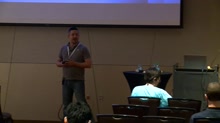[C++17] Structured Bindings - Convert struct to a tuple (simple reflection)
An interesting piece of code!
[C++17] Structured Bindings - Convert struct to a tuple (simple reflection)
From the article:
Very simple approach to convert any struct (up to N members) to a tuple using C++17 structured bindings and the idea from Boost.DI (http://boost-experimental.github.io/di/cppnow-2016/#/7/11) used to detect type constructor traits.

 Have you registered for CppCon 2016 in September? Don’t delay –
Have you registered for CppCon 2016 in September? Don’t delay –  Have you registered for CppCon 2016 in September?
Have you registered for CppCon 2016 in September?